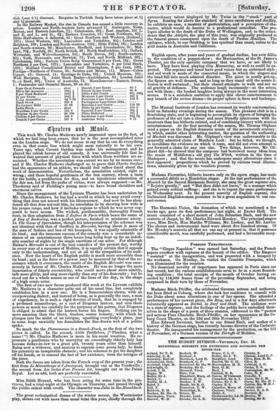iquitrto auli
This week Mr. Charles Mathews newly impressed upon us the fact, of which we had long been aware, that he is the most accomplished actor on the London stage. We do not mean to say that he can do everything even in that comic line which might seem naturally to be his own. Years ago, when Covent Garden was under his management and he played the rakish heroes of old comedy, it was universally felt that he wanted that amount of physical force with which those worthies are as- sociated. Whether the association was correct we are by no means sure ; and if Mr. Charles Mathews challenged us to prove that Charles Surface had the appearance of an athlete, we should feel rather timid about the work of demonstration. Nevertheless, the association existed, right or wrong ; and those hopeful gentlemen of the last century, whom a taste for the bottle, a predilection for dice, and an injudicious admiration of the fair sex, led from the paths of virtue, were always supposed—as Mr. Thackeray said of Fielding's young men—to have broad shoulders and enormous calves.
Since the management of the Lyceum Theatre has been undertaken by Mr. Charles Mathews, he has had a world in which he may avoid every- thing that does not accord with his idiosyncracy. And now he has aban- doned all that does not suit him, he astonishes us by showing how wide is his proper range, and how it includes regions to which he was never sup- posed to have access. The wicked, gentlemanlike, thoroughly French roué in that adaptation from L'Enfant de Paris which bears the name of A Day of Reckoning, was a perfect picture, finished to miniature nicety. In The Game of Speculation, though his interpretation of the schemer was not identical with that of Geoffrey in Mereadet, having about it more of the man of fashion and less of the bourgeois, it was equally admirable of its kind ; and the immense success of the comedy was a remarkable in- stance of an entertainment three hours long being kept up for an indefi- nite number of nights by the single exertions of one actor. For although Balzac's Mereadet is one of the best comedies of the present day, worthy in every way of a successor of Moliere, it is equally certain that it appeals only to the understanding, and not at all to the sympathies of its audi- ence. Now the heart of the English public is much more accessible than its head ; and as the force of a power may be measured by that of the re- sistance which it overcomes, the result of the English Mercadet was enor- mously in favour of Mr. Charles Mathews. He was no longer the mere incarnation of fidgety eccentricity, who could move about more nimbly, talk more glibly, and sing more rapidly than any of his fraternity ; but he stood out for a whole season as one of the lions of the day, in the shape of a high comic actor. The first of two new farces produced this week at the Lyceum exhibits Mr. Mathews in a character quite out of his usual line, but completely establishes him in a new one. He is a Sornersetshire clown, with an overpowering dialect ; and instead of being, as is generally the case, a man of expediency, he is such a rigid devotee of truth, that he is engaged by a professed misanthrope, as a sort of Diogenes lantern, and uses those powers so much too candidly for the purposes of his patron, that Diogenes is obliged to admit that the lantern burns his fingers. Nothing can be more amusing than the blunt, fearless, coarse honesty, with which he plunges into the midst of an intrigue, upsetting everybody's plans, just as some huge unwieldy bee demolishes the fine-drawn web of a politic spider. So much for the Phenomenon in a Smock-Frock, as the first of the two pieces is called. In the second, Little Toddlekins ("Pheebus, what a name !") Mr. Charles Mathews is more in his usual vocation. He re- presents a gentleman who by marrying an exceedingly elderly lady has become father-in-law to a great girl, twenty years older than himself. Being now a widower, and anxious to espouse some young lady, he finds his paternity an insuperable obstacle ; and his schemes to get his daughter off his hands, or to conceal the fact of her existence, form the intrigue of the piece. Both the farces are taken from the French crop of the present year ; the first from Le Misanthrope et 'Aucergnat, brought out at the Vaudeville ' • the second from Les Suites d'un Premier Lit, brought out at the Palais Royal. Let us add, both are perfectly successful.


































 Previous page
Previous page